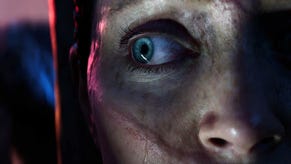Chronicling Riddick: Star Treatment
Film licences. Phew - let's not even get into that! Actually, how about we do? We're talking to members of the Chronicles of Riddick team at Starbreeze, who have just created one of the most critically acclaimed film licences since GoldenEye. But how?
How do you make a good game out of a film licence? Given the sheer volume of licensed games roaming the charts and review pages of magazines and websites, and the even greater number in development at any given time, you might imagine that it's a question that dominates the thoughts of sleepless publishing executives the world over. But there's little evidence that it does. A solid film brand is a solid money-spinner, but if you ask the average critic to list a handful of top quality licensed games, he probably wouldn't make it past his index finger. Or even his thumb.
Uncertain beginnings

Instead there is a sense that, beyond licensing a film and tossing it into the lap of an internal or a contracted studio, publishers don't really know what to do with these things. Should they mimic the structure of the film and allow players to relive key events? Should they act as a supplement to the main picture, fleshing out secondary characters and back-stories whilst adhering to the tenets of genre? Neither option is a sure fire route to success, but neither option is without successful precedent either. GoldenEye famously delivered on the former, whilst games like Lord of the Rings titles and Enter The Matrix have divided opinion but clinched millions at retail.
From a gamer's perspective, the key issue is simply delivering an engaging and rewarding gaming experience, and integrating the film without it feeling contrived. A recent example, Van Helsing, was heralded for having taken significant strides in this respect. Developer Saffire tackled the tricky problem of creating a game out of 2004's most overblown filmic action sequences by borrowing the game structure wholly from Capcom's critical darling Devil May Cry. And it worked, but only up to a point. Having initially profited from the Devil May Cry series latter day failings, Van Helsing kept our attention for an hour or so of gorgeous visuals and DMC-issue gameplay, but failed to develop itself beyond the opening salvo. Ultimately it became a shallow clone, and for all the actors' attempts to deliver the dialogue believably, their contribution felt tacked on. So that's not the way to do it either.
The team at Starbreeze Studios, developer of The Chronicles of Riddick: Escape From Butcher Bay (preview, screenshots), arguably set off on their path into the world of licences without a solution to the problem either - just as so many like Saffire had done before them. "We really, really want to have a success now after Enclave," lead modeller Pelle Tingström tells us frankly at one point - a desire that led the Swedish firm into an agreement with Vivendi-Universal Games to develop the Riddick property. "We approached one another, I guess," lead programmer and designer Jens Andersson says, ruminating on how Starbreeze got involved. "We discussed different properties and projects and we came across this new movie that was supposed to be made, and it went from there."
A star is born
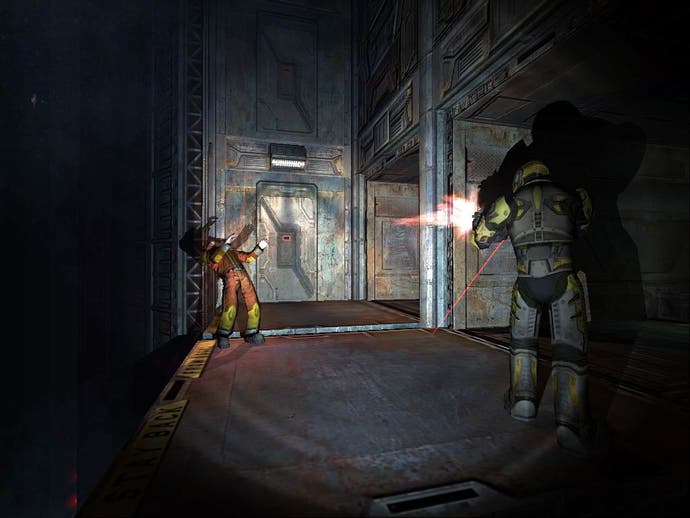
Such humble beginnings and almost Darwinian business principles probably lie behind most major film licences. Ask Electronic Arts execs whether they wanted to make games based on The Lord of the Rings for creative or commercial reasons, and they wouldn't hesitate to point to their bottom line rather than professing any particular ambition to build on Tolkien's work, whatever the actual programmers and artists may have felt when the project fell into their lap. But the difference in the case of Starbreeze is that Escape From Butcher Bay has been incredibly well received. Buzz from the States, where the game was released last week, has been uniformly positive. With this in mind, we wanted to find out how Starbreeze's approach differed.
The decision that really set the developer off in the right direction, and helps suspend disbelief in ways that licensed games like Minority Report and Van Helsing never have done, was not to pander to the prevailing orthodoxy of the film licence: shadowing events on the silver screen. "One big thing that was decided really early on was to do the game completely separate from the movie," Andersson tells us. "You don't see any scenes from the game in the movie. That's probably the reason we have more freedom than probably many other games, like for instance The Lord of the Rings - that's all scenes from the movie. And that pretty much restricts the game design and the visual design a lot."
Separation alone isn't the key to success though. Atari may have enjoyed commercial success with Enter The Matrix, but a near-mauling from the critics left few in any doubt as to why it did so well - and arguably the presence of sequences filmed by directors the Wachowski brothers played a bigger part than the weight of the gameplay, which - despite an occasionally ingenious combat system - faltered far more often than it enthralled. A solid game design is obviously called for, and simply developing a bunch of what you might describe as 'deleted scenes' into a side-feature isn't what Starbreeze had in mind with Riddick. Nor did Vin Diesel.
Diesel power

In fact, the key to Riddick's success is arguably three things - the decision, taken early on, to avoid direct interaction with the film almost completely; a core comprising a solid first-person shooter, stealth, beat-'em-up and adventure elements; and the close involvement of the film's star Vin Diesel and his Tigon Studios company. Asked to trace the failure of Enter The Matrix - a game that obviously parallels the structure of Riddick in certain areas - Andersson points largely to the separation of responsibilities. "It's probably a matter of focus," he says. "I think we are pretty lucky because we could still have a big focus on the story driving aspects and that's with the help of Universal and Tigon trying to get the interaction with the movie, while we could really focus on great gameplay."
Interaction with Vin Diesel and Tigon Studios meant that the game was firmly imbued with the spirit of the film and particularly the character, which Diesel himself has professed to hold very close to his heart. "He gave us pictures, photos of him from, I think it was from the new movie - full body pictures and things like that, and we used a 3D scan for the basis of his model," Tingström confirms. "Then there was his voice." Indeed. The voice. Diesel contributed dialogue to the movie over three recording sessions, most of which took around 16 hours. But more than that, he also provided direct feedback to Starbreeze on the team's choice of direction.
The elements of acting are certainly something best left to the professionals, and watching some of the cut-scenes and dialogue sequences in the game, it's obvious why. Many games employ well known actors, but it isn't just about the actors, it's about the right delivery. A lot of games create an authentic framework in the same way Riddick has done - using the right actors and lip-synching them perfectly - but then opt to just mesh dialogue together from lines performed by actors who were probably never in the same room. Dialogue in Riddick, however, sounds like two people having a conversation, reacting to what one another has to say, and Diesel's influence as a thespian is certainly felt in this respect.
Freedom within four walls
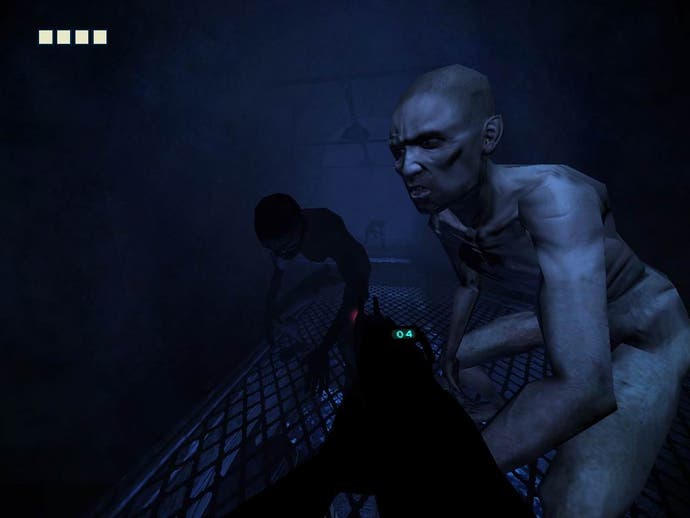
As well as helping to create his model and recording dialogue, Diesel also worked on the script, with the cut-scenes in particular receiving plenty of attention. "The thing that had most iterations involved in doing it was the cut-scenes, and the story driving events in the game," says Andersson. "So basically we did a draft, they rewrote it, we rewrote it, they rewrote it, a lot of dialogue had to be approved by multiple instances, back and forth, a lot of times. It was pretty rough to go through all this, but..." He trails off, breaking into an expression of satisfaction.
Rough it may have been, but it's clear talking to Andersson and Tingström that Diesel's and Universal Pictures' involvement was more helpful than intrusive, and even helped shape key elements of the game. For example, one of the sections in the Riddick game often associated with Diesel is the game's pit fights, which the film star and self-proclaimed games enthusiast has been credited with coming up with largely by himself. "It's a combined idea I guess," Andersson argues. "The idea of pit fighting came from Universal and it was modified to work in the game. But it was something we wanted to see in the game, and it fitted rather well with the improvements we were planning."
However we do get a sense that the lack of friction was largely fortuitous. Although "they had very strict opinions of how [one character] should look," according to Tingström, crossover with the film was largely handled through the script, and key characters were interwoven in a manner that ultimately suited both parties. "I'm not sure we were forced to do anything," says Andersson. "You know, you have a real tight communication with the publisher... you really evolve ideas into something that works for both parties."
Fear of Hollywood
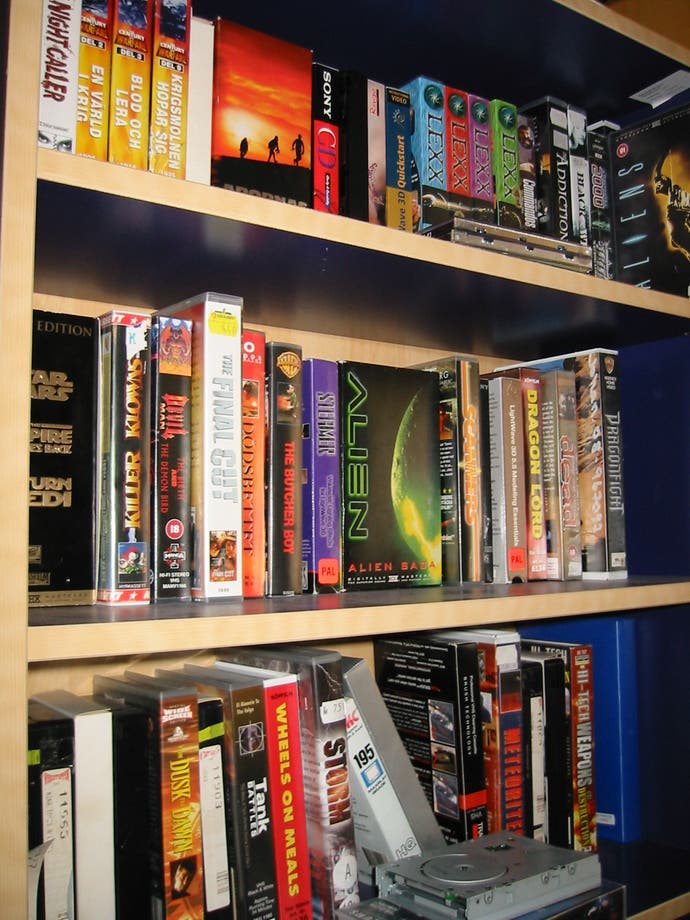
The question of whether the Starbreeze and Tigon style of collaboration would work all the time is difficult to answer, because from our conversations with the team it appears that more or less every item of any importance was agreed on perfectly amicably. Asked whether there was anything that Universal vetoed from Starbreeze's design, they both jokingly remark "Probably!" but quickly erupt into laughter. "Nothing big I think," says Andersson. "We were thinking about having a female section of the prison for example. I'm not sure if we dropped it or if they... I think they didn't want it." "No women at all," adds Tingström. Neither developer appears to regret that decision. One has to wonder how the process would have fared if Universal's desired alteration had been something 'big'.
Clearly Diesel's knowledge of games and desire to make a good one was critical to avoiding the sort of conflict that might have become an issue. Nevertheless, both developers admit to feeling his influence at times, and their reaction in one case showed it more than any other. Asked whether he was pleased with the final game, Andersson says "Yes," and Tingström quickly blurts "Thank God!" We all laugh. "I really think he's quite happy about it. It could have been a lot worse," he adds. Indeed - neither developer is even sure whether the game, the product of years of work, would have been released at all had Diesel not been completely happy with it. Could he have stopped it completely?
Andersson isn't sure. "There's various contracts back and forth with Vivendi and Tigon. But you know these kind of actors, they are so powerful, which was something we noticed during the game development. They can basically do anything because they have so many people that make it happen for them." All the same, it's clear that both were grateful to have Vin Diesel - somebody who knows and respects both the film and videogame mediums - rather than a star with his own view of how things should be done. "Yeah, I mean he could have been a real bitch!" says Tingström jokingly. "But it worked out very well."
Vindication
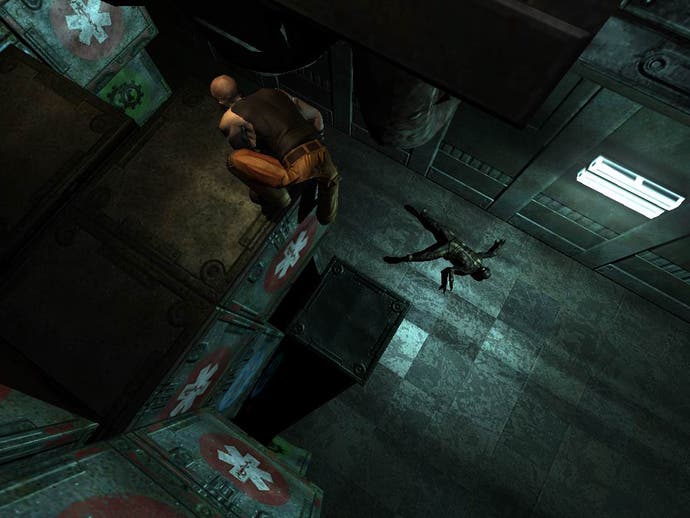
If the buzz is any indicator, he's certainly right about that. Escape From Butcher Bay has been picking up high scores in the US, and a quick run through of the game reveals a very cohesive first-person game blending elements of stealth, all-out action and storytelling in a manner reminiscent of Half-Life. A very different experience to playing the majority of film licensed games, but it's clear that Starbreeze was very fortunate to find a pair of companies in Universal and Tigon who were prepared - perhaps at the whim of Diesel - to truly let them off the leash.
Both men agree that the experience was not what they expected. "I was quite surprised we got a lot of freedom," says Tingström. "In the beginning we didn't know what we would make with this game, so the first thing was we thought we would make a game of the movie in a very restricted, controlled way." And yet as it turned out, the decision to let Starbreeze develop a game above all else has paid off, with a build-up of critical acclaim that could even help drive audiences to the cinema - something that very few film licences can honestly claim to have done.
It seems clear, then, that the key to making a good film licensed game in this case was freedom of creativity on the one hand, and a healthy, frictionless creative relationship with the rights-holder on the other. If there's enough quality involved in that equation, and enthusiastic parties working on both sides, it's bound to shine through. The irony, perhaps, is that it took a game about escaping from the universe's toughest prison to uncover the formula.
Check back later this week for a closer look at the game itself, the motivation behind the varied approach to the gameplay, and the developer's thoughts on the game's early critical response. The Chronicles of Riddick: Escape From Butcher Bay is due out in Europe on August 13th.






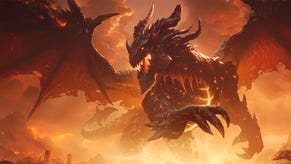
.png?width=291&height=164&fit=crop&quality=80&format=jpg&auto=webp)
